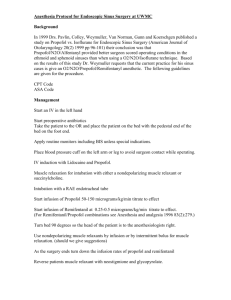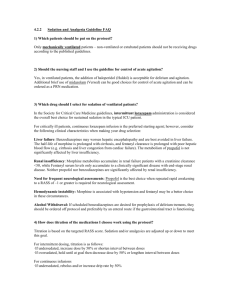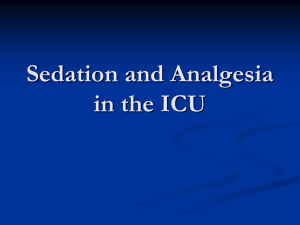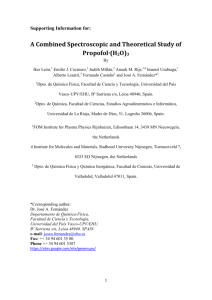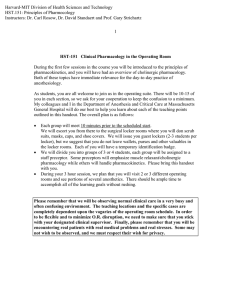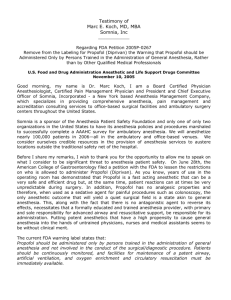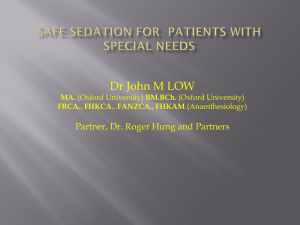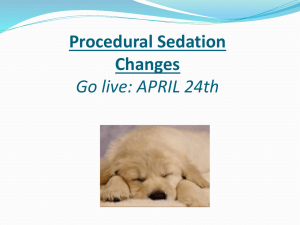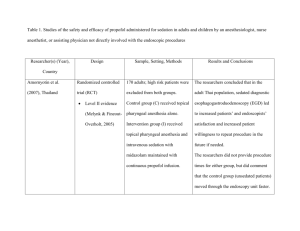Testimony of Eugene Sinclair, MD
advertisement
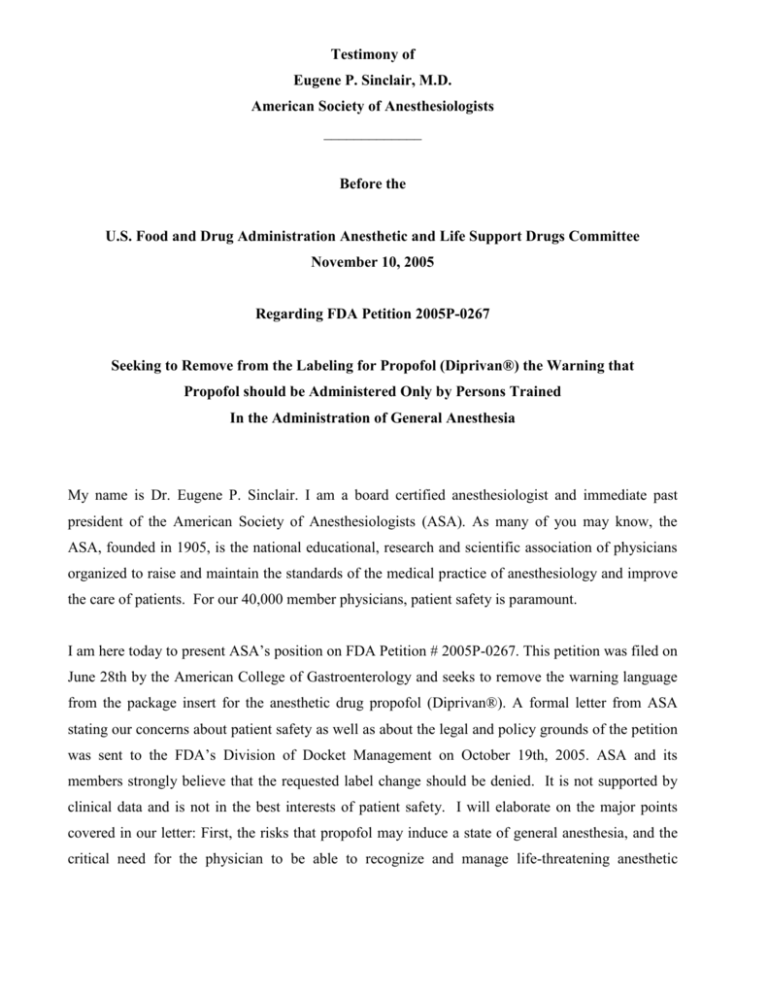
Testimony of Eugene P. Sinclair, M.D. American Society of Anesthesiologists _____________ Before the U.S. Food and Drug Administration Anesthetic and Life Support Drugs Committee November 10, 2005 Regarding FDA Petition 2005P-0267 Seeking to Remove from the Labeling for Propofol (Diprivan®) the Warning that Propofol should be Administered Only by Persons Trained In the Administration of General Anesthesia My name is Dr. Eugene P. Sinclair. I am a board certified anesthesiologist and immediate past president of the American Society of Anesthesiologists (ASA). As many of you may know, the ASA, founded in 1905, is the national educational, research and scientific association of physicians organized to raise and maintain the standards of the medical practice of anesthesiology and improve the care of patients. For our 40,000 member physicians, patient safety is paramount. I am here today to present ASA’s position on FDA Petition # 2005P-0267. This petition was filed on June 28th by the American College of Gastroenterology and seeks to remove the warning language from the package insert for the anesthetic drug propofol (Diprivan®). A formal letter from ASA stating our concerns about patient safety as well as about the legal and policy grounds of the petition was sent to the FDA’s Division of Docket Management on October 19th, 2005. ASA and its members strongly believe that the requested label change should be denied. It is not supported by clinical data and is not in the best interests of patient safety. I will elaborate on the major points covered in our letter: First, the risks that propofol may induce a state of general anesthesia, and the critical need for the physician to be able to recognize and manage life-threatening anesthetic 2 complications, and second, the lack of crucial evidence that it may be safely administered by clinicians not trained in anesthesiology. The first and foremost point is that propofol is a powerful anesthetic agent that can produce varying levels of sedation along the continuum from sedation to general anesthesia. Because sedation is a continuum, it is not always possible to predict how an individual patient will respond. The extremely rapid onset and high potency of propofol make it very easy to “overshoot” the desired level of sedation. A standard intravenous dose of propofol can cause a patient to enter an unintended state of general anesthesia within as little as 30 seconds. Patients differ widely in their individual reactions to a standard dose. There is also an impressive 20-fold variation among individuals in the rate of metabolism of propofol. It is also very important to note that propofol has no antagonist or reversal medications, which distinguishes it from other sedatives, such as benzodiazepines and narcotics, that are currently used by non-anesthesiologist physicians. Due to the potential for rapid, profound changes in sedative/anesthetic depth and the lack of antagonist agents, drugs such as propofol require special attention. This means that the clinician administering propofol must be competent to recognize instantly and rescue instantly a patient experiencing any of the complications of general anesthesia, which include life-threatening respiratory and cardiovascular emergencies. Therefore, the physician should have the education and training to manage the potential medical complications of sedation and anesthesia. The physician should be proficient in recognizing the sometimes-subtle signs of adverse respiratory or cardiovascular events. He or she must have the knowledge and technical skills to manage hypoxia, hypoventilation, bradycardia, tachycardia, hypotension and hypertension. Failure to rescue has consistently been reported in the gastroenterology literature as a prominent cause of poor outcomes. In particular, that literature shows greater rates of complications among patients with imperfect health and patients who are older than 50 years of age. Some state health agencies are also aware of the threat to patient safety. Between 2001 and 2004, no fewer than 38 deaths related to the performance of endoscopies in ASCs were reported to the Florida Health Care Administration Board of Medicine. We note that many gastroenterologists use anesthesiologists or CRNAs and are unwilling to jeopardize patient safety. For that reason, some of its own members oppose the ACG’s stance on 3 propofol and the ACG’s immediate past president has said he believes “that this is the most internally divisive issue in clinical gastroenterology at this time.” Privileges to administer general anesthesia, awarded by the facility in which a physician practices, would be the best indicator of satisfactory training and experience in the use of propofol. Removal of the warning label from the propofol package insert may encourage the use of propofol by practitioners with inadequate training and experience – particularly in non-accredited facilities where credentialing is not required, such as private offices. With 20% of procedures already being performed in private offices, and the proportion expected to grow, this could pose a major patient safety risk. Not all private offices or endoscopy ASCs are equipped or staffed for emergency care. Nor are they all located within a couple of minutes of anesthesiologist or emergency physician services. We have heard of facilities relying on 911 as their front-line emergency system. This is not acceptable. The ACG petition also seeks the removal of the portion of the propofol label warning that the individual administering propofol should not be involved in the conduct of the diagnostic or surgical procedure. We are concerned that granting the petition would make it more likely, especially in the private offices mentioned above, that the gastroenterologist performing the endoscopic procedure might not use a second clinician to administer the propofol and monitor the patient continuously, with no other responsibilities. A dedicated, competent independent observer is indispensable to the safety of sedation with propofol. The ACG presented many studies in support of their position. We asked the Methodology Group of the ASA Committee on Practice Parameters to analyze the studies cited, using standard techniques for assessing the strength of literature for the preparation of evidence-based practice parameters. The methodologists concluded that the studies did not provide sufficient statistical or meta-analytical evidence to address the two major safety concerns: 1. Use of propofol by non-anesthesiologists 2. The involvement of the same physician responsible for the sedation in the conduct of the surgical/diagnostic procedure. 4 Only one of the studies sufficiently addressed the administration of propofol by anesthesiologists compared to non-anesthesiologists. In a recent abstract of that study, the investigators, not surprisingly, concluded that administration of propofol by anesthesiologists is associated with a lower relative risk of cardiopulmonary complications compared to its administration by non-anesthesiologists. Another reason why the studies cited in the petition fail to establish the safety of propofol is that the expected anesthesia mortality rate in healthy patients is 1 in every 300,000 cases. All of the studies combined did not encompass 300,000 patients. The number of cases required for statistical significance far exceeds that number. The American Society of Anesthesiologists is proud of its success in bringing the rate down to this level – but we do not believe that it means that all clinicians can safely administer deep sedation or general anesthesia. This petition is not just about gastroenterologists or the ACG. Removing the warning label from propofol could encourage its wider use by other non-anesthesiologists. There is reason to believe that the number of complications would be even greater if that were to occur. For example, emergency room physicians face particular risks since their patients are not usually fasting and thus can be expected to have a higher incidence of aspiration. Pediatricians have even greater challenges titrating propofol for their immature patients. Given the totally inconclusive research presented to this committee on the safety of propofol administration, with or without continuous monitoring of the patient, by non-anesthesiologists – including emergency and pediatric specialists -- and the irrelevance of the gastroenterologists’ practice preferences or economic concerns discussed in the ACG petition -- the FDA should not change the warning label on propofol. For decades, The American Society of Anesthesiologists’ members' primary interest has been patient safety. Our responsibility is to assure the best possible care for the patients who entrust their lives and well-being to their anesthesiologist. There is no evidence to show that patient safety will be protected by the proposed labeling modification, and therefore the FDA must deny the Petition. Thank you.
